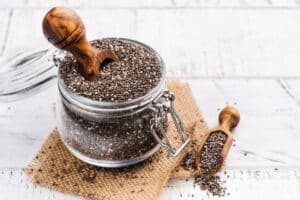What’s your go-to comfort food in the winter? Hot cocoa and a big stack of warm cookies? Buttery mashed potatoes with gravy? These treats are great once in a while. But for your regular cold weather diet, you might find the greatest “comfort” of all is to have more energy and fewer mood swings — not to mention cutting back on Kleenex and cough medicine!
The Importance of “Superfoods” During Cold Weather
It’s not your imagination — weathering winter gets tougher the older you get. You probably have less energy to tackle cleaning snow from your windshield, or pushing the shopping cart through frozen slush. But if you follow your impulse to just hibernate and indulge in rich, sugary treats, your already fluctuating hormone and energy levels will get even more unpredictable.
Women’s ability to fight off illness can also decrease in middle age. Your resistance to bacterial and viral infections — which spread more rapidly in winter — can really take a hit. Adding a superfoods list to your diet is one way to boost your immune system to mitigate these cold weather challenges.
Get Fishy
Older adults need extra Vitamin D. The sun provides less of this vital nutrient in the winter, making diet an even more important resource for vitamin D. Tuna, mackerel and salmon are among the only foods naturally high in the vitamin.
 Fish is also rich in protein, which stabilizes blood sugar and hormone levels. These two functions most likely fluctuate wildly in the wintertime, when we become less active and have less sunlight. In addition, fish is easier to digest than other animal-based protein, meaning you get more of that hormone-regulating benefit that’s so important starting in your 40s.
Fish is also rich in protein, which stabilizes blood sugar and hormone levels. These two functions most likely fluctuate wildly in the wintertime, when we become less active and have less sunlight. In addition, fish is easier to digest than other animal-based protein, meaning you get more of that hormone-regulating benefit that’s so important starting in your 40s.
If you get tired of the same old broiled salmon with steamed vegetables, try to mix things up a bit. Have tuna sandwiches for lunch a couple of days a week. Make “Taco Tuesday” a fish taco event, and go out for sushi on date night.
Fortify Yourself
Along with fish, you’ll find a wide range of foods fortified with Vitamin D. On your superfoods list, look for cereals, dairy milk, plant-based milk, and orange juice labeled as fortified with both Vitamin D and calcium. (Calcium, which you need year-round for bone protection, is also crucial for helping you absorb the Vitamin D).
Other foods have at least modest amounts of the nutrient. Does a cheesy omelet sound like the perfect winter breakfast? Take extra comfort in knowing that one made with two egg yolks and 1 ounce of Swiss cheese provides you with about one-quarter of your daily Vitamin D requirement!
Feel Your Oats
Everyone turns to zinc tablets at the first sign of a cold. But why not consume zinc more regularly, to prevent illness in the first place? Oatmeal is rich in the mineral. Not only does this hot cereal warm you up before facing the elements, it also provides complex carbs that won’t send you into a sugar crash mid-morning.
Worried about the extra sugar and preservatives in instant oatmeal — but love the convenience? Put your ingredients in the slow cooker overnight, and enjoy it in the morning with no hassle.
Savor Soup Season
 Soup is on top of just about everyone’s list of cold weather comfort foods. Besides being inherently comforting, vegetable soup is chock-full of the nutrients you need to boost your immunity during cold and flu season. As a bonus, a broth-based soup provides extra hydration, which your wind-chapped cheeks and overworked organs will thank you for.
Soup is on top of just about everyone’s list of cold weather comfort foods. Besides being inherently comforting, vegetable soup is chock-full of the nutrients you need to boost your immunity during cold and flu season. As a bonus, a broth-based soup provides extra hydration, which your wind-chapped cheeks and overworked organs will thank you for.
Whether you choose vegetable broth or chicken broth as the base, the liquid portion of the soup yields added nutrients. Chicken broth is mineral-rich and packed with B vitamins, while vegetable stock yields tons of antioxidant vitamins.
Make sure to create your soup with a “rainbow” of vegetables for as many immunity-boosting nutrients as you can, from tomatoes and carrots to beets and spinach. The inclusion of your favorite dried beans will further boost the good-for-you quotient.
Super Sides
Woman can’t live by soup alone. But even when you’re going the steak-and-potatoes route, make sure to serve up a bowl of nutritious vegetables on the side. Cauliflower and broccoli are great choices from the superfoods list in the winter months because they give you large doses of immunity-boosting Vitamin C.
When you want something heartier, turn to root vegetables. They’re not just for the winter holiday table! Mashed sweet potatoes, roasted carrots, turnip puree are all great options. Whatever your favorite root veggies, your body will thank you for the extra fiber and vitamins, especially A and C. And don’t forget your beets! This root vegetable is especially high in Vitamin B6, which gives you extra energy for those wintertime “blahs.”
Persist with Pumpkin
 It’s not your imagination: symptoms of perimenopause and menopause are actually worse in the wintertime for many women. That’s because the plunging temperatures and decreased hours of sunlight tend to make hormones fluctuate. Foods that help restore some of that lost balance are especially helpful.
It’s not your imagination: symptoms of perimenopause and menopause are actually worse in the wintertime for many women. That’s because the plunging temperatures and decreased hours of sunlight tend to make hormones fluctuate. Foods that help restore some of that lost balance are especially helpful.
Maybe that’s why pumpkins have persisted as classic cold weather meal ingredients. These harvest favorites are rich in hormone-balancing nutrients like selenium, zinc and Vitamin C.
Pumpkins are also incredibly versatile. It works in both savory and sweet dishes. Use canned pumpkin puree or stuff ravioli for dinner, to include in breakfast muffins and snack bars — and, of course, for a festive pie.
Pucker Up
With hormone balance even more challenging during the winter, a superfoods list can come in handy. One unlikely ally is the humble prune. You may only associate these puckery dried plums with staying “regular.” But they’re also rich in many trace minerals other foods lack.
One such mineral lurking under that puckery exterior is boron. This nutrient is especially useful for women looking to balance estrogen loss during perimenopause and menopause. Boron amplifies the benefits of natural estrogen, as well as the Vitamin D you take in.
Of course, eating too many prunes in one sitting can have you running to the bathroom a few hours later. In addition, like other dried fruits, they have a higher concentration of sugar than fresh fruit. Keep your daily consumption to under 10 prunes. Eat them whole, or toss them into smoothies and muffins for extra sweetness, fiber, and hormone-balancing goodness.
Get Nutty
 Like prunes, nuts and seeds are packed with hormone-balancing minerals, including potassium and magnesium. They’re also high in protein, allowing you to keep your blood sugar steady even after snacking. Choose from almonds, walnuts, sunflower and pumpkin seeds.
Like prunes, nuts and seeds are packed with hormone-balancing minerals, including potassium and magnesium. They’re also high in protein, allowing you to keep your blood sugar steady even after snacking. Choose from almonds, walnuts, sunflower and pumpkin seeds.
Seeds and chopped nuts are a much healthier way to add crunch to a casserole or salad than breadcrumbs and croutons. In addition, you can pulverize nuts and/or seeds in a food processor. Use the nutrient-dense fine crumbs as a replacement for some of the flour in your favorite cookie and muffin recipes.
If your diet isn’t doing what it should to help you regulate your mood swings, energize you, or boost immunity, talk to your doctor. You may still be deficient in certain nutrients. Adding new foods, and even supplements, to your cold-weather meals can not only keep you healthy — but also break up that wintertime monotony!







